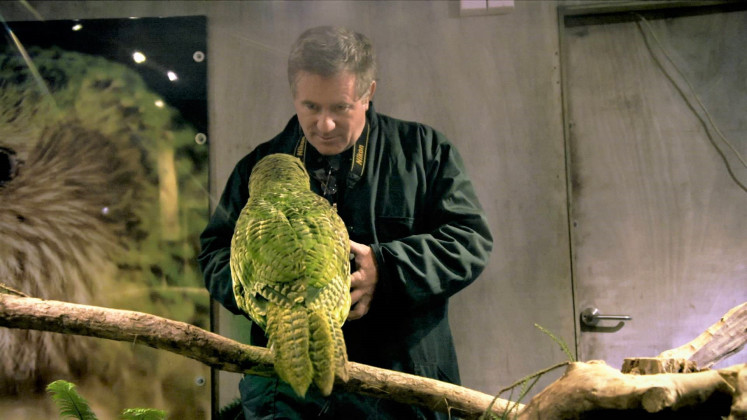Popular Reads
Top Results
Can't find what you're looking for?
View all search resultsPopular Reads
Top Results
Can't find what you're looking for?
View all search results‘Jane Goodall: The Hope’ set for Earth Day premiere
National Geographic will celebrate Earth Day on April 22 with two world premieres – Photo Ark: Rarest Creatures and Jane Goodall: The Hope – to inspire people to love our only home in these unprecedented times.
Change text size
Gift Premium Articles
to Anyone
 Environmental trailblazer: Even at 86 years old, Jane Goodall still travels extensively as part of her role with the Jane Goodall Institute, which she founded in 1977 to continue her research on chimpanzees as well as advocate for conservation and environmental education. (Courtesy of National Geographic/-)
Environmental trailblazer: Even at 86 years old, Jane Goodall still travels extensively as part of her role with the Jane Goodall Institute, which she founded in 1977 to continue her research on chimpanzees as well as advocate for conservation and environmental education. (Courtesy of National Geographic/-)
F
or the 50th anniversary of Earth Day on April 22, the National Geographic channel will broadcast back-to-back premieres of Photo Ark: Rarest Creatures and Jane Goodall: The Hope.
Indonesians can catch the premieres through their preferred subscription service, beginning at 7 p.m. with Photo Ark: Rarest Creatures that follows National Geographic photographer Joel Sartore on his globetrotting mission to photograph some of the rarest wildlife in the world.
Sartore’s project, the Photo Ark, is his 25-year-long, primarily self-funded quest to document the world’s animals before they go extinct.
The Photo Ark began in 2005 when Sartore’s wife Kathy was diagnosed with cancer. As Sartore stayed home to take care of his wife and children, he gained a new perspective on the shortness and fragility of life.
One question Sartore had was “how can I get people to care that we could lose half of all species by the turn of the next century?”.
With this burning question in mind, he set out to photograph 12,000 animal species currently in human care before it is too late.
Currently, there are 9,844 species in the Photo Ark, spanning some 33,844 pictures shot with a simple black or white background.
“Perhaps a series of portraits, made as simply and cleanly as possible, would give us all a chance to look animals directly in the eye and see that there’s beauty, grace and intelligence in the other creatures we share the planet with,” Sartore wrote on his website.
“Black and white backgrounds level the playing field, making a mouse every bit as grand as an elephant. In these portraits, they are equals.”
At his website, joelsartore.com, visitors can search for images of specific animals or scroll down to see the thousands of images.
Jane Goodall: The Hope follows at 8 p.m. – a two-hour documentary on the life and times of the figure considered by many to be the world’s foremost expert on chimpanzees for her decades of experience and studies on the primate since she went to the Gombe Stream National Park in Tanzania in 1960.
Picking up after the 2017 biographical documentary Jane, the latest one highlights the creation of the Jane Goodall Institute’s Lake Tanganyika Catchment Reforestation and Education (TACARE) program and the Roots & Shoots youth empowerment program.
TACARE was first launched in 1994 to address poverty and support sustainable livelihoods for the communities living around Lake Tanganyika, the second-deepest, second-oldest and second-largest-by-volume freshwater lake bordering four African countries.
Meanwhile, Roots & Shoots was founded in 1991 when Jane worked with a group of Tanzanian students to discuss the role of youth in bettering the world. The initiative started with 12 students, and now has expanded to an active movement in over 60 countries.
Apart from her activism, the documentary also touches on the 86-year-old’s hope for future generations.
“Being out in the forest of Gombe, I had a great sense of spiritual awareness; I began to realize that everything is interconnected,” Goodall said.
“Since then, every day, it’s become clearer that climate change is an existential threat to our natural world, and if we destroy this world, we destroy our own future.
“Each day, every single person has the chance to make an impact through small, thoughtful choices, and when billions of people make the right choices, we start to transform the world. Don’t give up; there’s always a way forward.”
Along with Goodall, the documentary also features interviews with The Duke of Sussex, Prince Harry, as well as experts in the field such as former US secretary of state James Baker, Harvard University professor of biological anthropology Richard Wrangham, director of the National Institutes of Health Francis Collins, and cofounder and director of the Institute of Human Virology Robert Gallo, who codiscovered HIV.
The figures featured in the documentary were not chosen at random: Prince Harry has been an ardent supporter of environmental and conservation issues; Baker was the first recipient of the Jane Goodall Institute International Conservation Award for his work with chimpanzees; Wrangham founded the Kibale Chimpanzee Project; and Collins championed the retirement of government research chimpanzees after speaking with Goodall.
Courteney Monroe, president of the National Geographic Global Television Networks, said in a statement that the 50th Earth Day was an opportunity to inspire viewers through the wonders of our planet and its incredible species, as the need to protect the planet becomes more urgent.
“With the Earth Day takeover across all of our networks and platforms, we are able to reach the largest audience possible to celebrate this momentous day and ensure that viewers fall in love with our planet and act to protect it,” she said. (ste)











